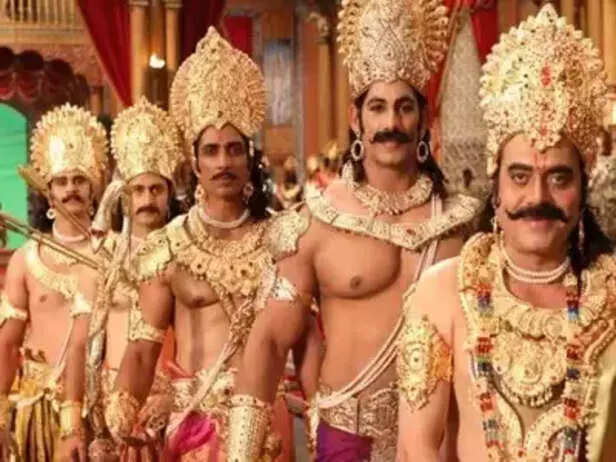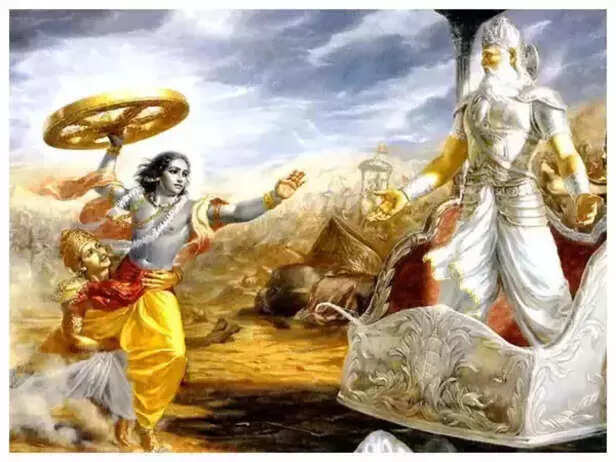Draupadi: The Feminist Icon Way Ahead of Her Time
Amritansh Nayak | May 17, 2025, 12:00 IST

In the patriarchal society of the Mahabharata, Draupadi was more than just a queen; she was a fearless voice. She is a timeless feminist figure because of her power, tenacity, and defiance of gender stereotypes, which she has used to influence war decisions and demand justice. Women are still inspired by her tale to speak up, stand up, and succeed.
During a time when women were supposed to remain quiet and obedient, Draupadi dared to break all the rules. A pivotal character in the Mahabharata, she was renowned for her fiery sense of justice, unflinching dignity, and audacious defiance of patriarchy in addition to her beauty and royal status. Draupadi turned her sorrow into meaning, stood up when others were mute, and demanded justice—even from kings and gods. As a potent representation of female agency, bravery, and fortitude, her narrative never fails to inspire.

During a period when women were supposed to remain mute and let their fate unfold, Draupadi stood out as a unique voice of dignity and opposition. She was a woman who dared to speak when even the strongest decided to remain silent, not just a queen or a wife. During the notorious dice game event in the Mahabharata, she made her strongest statement of autonomy. She did not cry in private or beg for forgiveness when she was hauled into the royal court and humiliated in front of her five husbands and the elders. She insisted on answers instead, first asking if Yudhishthira had the right to stake her after losing himself, and then looking at the elders who were mute and asking them if it was moral for them to do nothing.
The ceremonial quiet of patriarchy was broken by her voice. Whether it was the blind monarch Dhritarashtra, the revered Bhishma, or even her own husbands, she dared to challenge the established power structures in her environment. Draupadi is a potent emblem of agency because of her refusal to tolerate injustice and her demand to be heard. She was a feminist icon who was millennia ahead of her time because she chose resistance in a society that demanded surrender.

Draupadi was strong not only because of what she did but also because of her strong sense of self. She was a fiercely passionate, incredibly intelligent, and steadfastly convinced woman who never once apologized for who she was. By embracing her whole range of emotions, Draupadi broke conventions in a time when women were idealized as kind, submissive, and selfless. She mourned without shame, confronted injustice with ferocity, and publicly vented her rage. She pledged that her humiliation would not go unpunished and that her fury following the dice game was neither concealed nor repressed. She questioned her spouses' silence and demanded accountability from both her adversaries and herself.
In a patriarchal society where women were supposed to suffer in quiet, this was a revolutionary act. Draupadi also made audacious decisions, such as publicly vowing not to bind her hair until Dushasana was punished and seeking retribution. These were purposeful declarations of her strength and dignity rather than merely emotional outbursts. She gained respect by being steadfast in her beliefs rather than by trying to fit in. Draupadi's unreserved honesty is still a timeless lesson in self-worth in a world when women are still advised to be "less emotional" or "more agreeable."

Although controversy frequently surrounds Draupadi's polyandrous marriage, her ability to rise beyond that identity and establish herself as a source of strength, harmony, and purpose inside the Pandava home is what really makes her unique. Her five strong spouses did not eclipse her; rather, she became a dominant force on the moral, intellectual, and emotional fronts. Respect for one another, not servitude, was the foundation of her relationship with each Pandava. When the Pandavas faltered, Draupadi reminded them of their dharma, kept the household together during exile, and preserved the family's dignity in spite of humiliation.
Her advice frequently served as the impetus for important decisions, such as the demand for justice following the dice game and the fight for war to retake their rightful realm. Her words had weight. She co-designed their future and was more than just a wife. Her steadfast determination and capacity to handle challenging relationships without sacrificing her uniqueness are testaments to her inner strength. Five different personalities were brought together and given a common goal by Draupadi's presence. In a society where women are frequently defined by their relationships, Draupadi turned the tables by demonstrating that a strong woman may influence monarchs' paths rather than merely following them.

From being publicly humiliated in the Kaurava court to going through years of exile and personal loss, Draupadi's life was characterized by great sorrow. But she never once came to terms with being a victim. Rather, she bounced back from each attack with more determination, exemplifying resilience in its purest form. Her unwavering spirit is demonstrated by her refusal to be broken or silenced, even under the most dehumanizing conditions. Draupadi did not give up in anguish when she was hauled into the court and humiliated. Asking monarchs, elders, and even gods about the moral decline of the civilization they supported, she boldly and publicly demanded justice.
Her pursuit of justice went beyond seeking personal retribution; it was also about reestablishing dharma and ensuring that such brutality would never occur again. Draupadi never let resentment control her, not even while she was in exile. Rather, she continued to be a source of courage and motivation for the Pandavas, encouraging them to overcome their defeat and continue fighting for justice. She turned her suffering into meaning. Draupadi is still a timeless representation of bravery, justice, and tenacity today, demonstrating to women everywhere that one's dignity and voice may illuminate the path even in the most dire circumstances.
The narrative of Draupadi is more than just a myth; it is a reflection of the enduring power and adversity of women. Generations are still inspired by her bravery, strength, and tenacity. She is a great feminist icon because she didn't just accept her situation; she questioned, contested, and overcame it.
Explore the latest trends and tips in Health & Fitness, Travel, Life Hacks, Fashion & Beauty, and Relationships at Times Life!

feminism
Agency and Voice in a Patriarchal Society
The ceremonial quiet of patriarchy was broken by her voice. Whether it was the blind monarch Dhritarashtra, the revered Bhishma, or even her own husbands, she dared to challenge the established power structures in her environment. Draupadi is a potent emblem of agency because of her refusal to tolerate injustice and her demand to be heard. She was a feminist icon who was millennia ahead of her time because she chose resistance in a society that demanded surrender.

women in epics
Unreserved in Her Identity and Feelings
In a patriarchal society where women were supposed to suffer in quiet, this was a revolutionary act. Draupadi also made audacious decisions, such as publicly vowing not to bind her hair until Dushasana was punished and seeking retribution. These were purposeful declarations of her strength and dignity rather than merely emotional outbursts. She gained respect by being steadfast in her beliefs rather than by trying to fit in. Draupadi's unreserved honesty is still a timeless lesson in self-worth in a world when women are still advised to be "less emotional" or "more agreeable."

pandav
The Five Husbands' Strength
Her advice frequently served as the impetus for important decisions, such as the demand for justice following the dice game and the fight for war to retake their rightful realm. Her words had weight. She co-designed their future and was more than just a wife. Her steadfast determination and capacity to handle challenging relationships without sacrificing her uniqueness are testaments to her inner strength. Five different personalities were brought together and given a common goal by Draupadi's presence. In a society where women are frequently defined by their relationships, Draupadi turned the tables by demonstrating that a strong woman may influence monarchs' paths rather than merely following them.

mahabharata
A representation of justice and resiliency
Her pursuit of justice went beyond seeking personal retribution; it was also about reestablishing dharma and ensuring that such brutality would never occur again. Draupadi never let resentment control her, not even while she was in exile. Rather, she continued to be a source of courage and motivation for the Pandavas, encouraging them to overcome their defeat and continue fighting for justice. She turned her suffering into meaning. Draupadi is still a timeless representation of bravery, justice, and tenacity today, demonstrating to women everywhere that one's dignity and voice may illuminate the path even in the most dire circumstances.
The narrative of Draupadi is more than just a myth; it is a reflection of the enduring power and adversity of women. Generations are still inspired by her bravery, strength, and tenacity. She is a great feminist icon because she didn't just accept her situation; she questioned, contested, and overcame it.
Explore the latest trends and tips in Health & Fitness, Travel, Life Hacks, Fashion & Beauty, and Relationships at Times Life!
